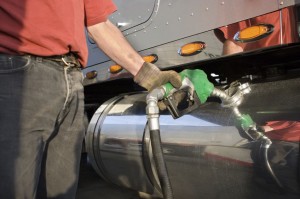-
10
Jan
Trucking Transport Could Change Significantly with Natural Gas
 Rather than be held hostage to petroleum prices, the trucking industry is seeking out alternatives for fuel, and natural gas could be the trucking transport fuel of choice for the future.
Rather than be held hostage to petroleum prices, the trucking industry is seeking out alternatives for fuel, and natural gas could be the trucking transport fuel of choice for the future.The trucking news conversation on natural gas advanced last week as some of the biggest players in the trucking industry met at the Mid-America Trucking Show in Louisville, Ken. Trucking transport accounts for around 70 percent of all the goods delivered throughout the U.S. Many millions of gallons of fuel are consumed by trucks, and the industry spends many millions of dollars on fuel costs. The trucking industry has to pass those costs along to its clients who pass their costs on to their clients – and eventually, the entire American economy is affected by fuel prices.
Why natural gas as an alternative? It’s found locally and it costs about $1.50 less per gallon than diesel. In America alone, we’re sitting on around 100 years worth of natural gas. But the technology to produce vehicles that can run on natural gas needs to be more affordable and the supply line of natural gas to a large fleet of trucks (there are around 3.5 million truck drivers strewn across the lower 48 states) needs to be fine-tuned.
There are companies already rolling out liquefied natural gas (LNG) and compressed natural gas (CNG) fueling stations. Pilot Flying J and TravelCenters of America are focused on LNG while Love’s is concentrating on CNG. A spokesperson at Love’s said they believe CNG will be of particular value to shorter-haul markets, and as the demand arises, the infrastructure supplying natural gas to the massive fleets of trucks will become more readily available.
Most states have recognized the potential for natural gas as a trucking transport fuel source and have incentives in place for it. The federal end of the deal has yet to shape up, but there is likely a lobbying effort in Congress to get those federal incentives underway. One key player in Congress could be the Natural Gas Act, which some have valued at $3 billion to $5 billion in incentives to companies that produce long-haul trucks outfitted with engines that will run on natural gas engines.
Companies like Pilot Flying J say they will continue their move in the direction of natural gas despite what happen in Congress. However, some are critical of the government’s higher tax on natural gas, which is around 40 cents, compared to the current 24-cent tax on diesel.